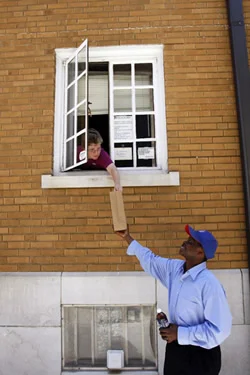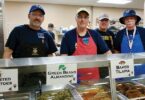
Smith hands a sack lunch to Daniel Chege. In May, the sandwich ministry distributed 1,632 lunches. Photo by Susan McSpadden.
by Bob Hart
There’s nothing fancy about it. The simple brown paper bag contains a sandwich (two slices of bread with one slice of bologna and one slice of American cheese), a small bag of chips and two cookies.
It is gratefully received. For some who accept it, there will be nothing else to eat that day. For others, it provides a much-needed supplement to a monthly food budget stretched well past its limit.
TOPEKA — The numbers tell the story quickly. Last year in May, the sandwich ministry that began at Assumption Parish in the 1950s handed out just over a thousand sandwich/chip/cookie combos. This year’s May total was up by more than 600 — 1,632 lunches in all.
“It’s no longer just the homeless, the street people,” said Sister Mary Corita Conlan, SCL, who administers the ministry at the now unified Mater Dei Parish. “We’re seeing low- and middle-class people, sometimes entire families.”
A troubled economy and local job layoffs are the clear culprits. The sandwich ministry strives to ease some of the pain.
“Now that school is out and children are not receiving free breakfast or lunch, the demand will only grow,” Sister Corita said. “I think this is going to be a very long summer for a lot of people.”
Jean Smith, who in her parish office support role has served the ministry for 27 years, hands out the lunches from a northwest office window a half-floor up from the pavement, where those in need ring the doorbell.
In extreme cold or heat, the mini-blinds stay down to give Smith a little protection from the elements. But the window is opened regularly, and the faithful know the lunches, as always, are available Monday through Friday.
“At the beginning of the month, we don’t hand out as many,” Smith said.
“On June 1 this year, we handed out 73. But the last two weeks of the month, we’ll push 100 every day, and go over 100 on a lot of those days.”
It’s strictly an honor system, as those requesting extra lunches for children or aging family members unable to make the trip are never denied.
Smith, who now knows most of her daily visitors by name, recalled the day more than a quarter century ago when then-associate pastor, Father Mark Goldasich, spoke in his homily of the ministry and those who occasionally try to abuse it.
“We may be tempted now and then to turn someone away,” he said. “But we have to remember — that’s Jesus coming to the window.”
Making the money count
Bologna, cheese and bread are purchased, usually weekly, from Dillons.
Twenty boxes of chips (50 sacks to a box) are purchased each month from Sam’s Club. Frito Lay donates an additional five boxes of chips per month, eight to nine months of the year. The cookies, two to a bag and of the sandwich variety, are also purchased in bulk.
Beyond the lunches, the parish also provides bus passes (370 of them in May of this year) and $15 grocery vouchers to those in need.
Who’s footing the bill for all this? That’s where things get a little complicated, although much of the support comes from the parish itself, and Sister Corita seems to have the additional money juggling down to a science.
“We have an agreement with a grocery store in the Oakland area for the vouchers,” Sister Corita said. “The Topeka priests send $850 monthly to the store, and $250 to me. I usually use that for the bus passes. I also have a Sisters of Charity account that I use to supplement the grocery store toward the end of the month. I’ll usually write a check for $300 or so later in the month so we can keep on providing that assistance.”
In June of this year, Sister Corita had to write that check earlier in the month than ever before — on the 17th — due to increased demand. She said she knows the vouchers only go so far, but they’re still important.
“What can you get for $15? Not much,” she said. “But you can get bread, some peanut butter, milk and eggs. It helps.”
Private donations, sometimes made anonymously, help fund some of the extras, like assistance with prescription medications or emergency travel costs.
The ministry can’t do everything, of course.
“We don’t do rent or utility payments,” Sister Corita said. “Our funds would be depleted immediately if we were to do so.”
Instead, the ministry makes referrals to other Topeka agencies, including Doorstep, the Salvation Army, Community Action and Let’s Help.
Hands on
Kathy Werth, a parishioner of Topeka’s Christ the King Church, is a regular sandwich ministry volunteer. She brings her eight children (ages 8 months to 14 years) and sometimes a niece and nephew along to help in assembling the sandwiches.
“We home school, and we’d been looking for a daily, hands-on service project,” Werth said. “We come to daily Mass here often and we had noticed more and more people ringing the bell.”
The family began volunteering during Lent earlier this year and continues to come back.
“If the kids argue about anything here, it’s who gets to answer the doorbell,” Werth said. “They really like to talk to the people. The parish ladies have been great; they’ll let them hand out a bus pass or take a little responsibility.”
“I think my kids are realizing how tough things are right now,” Werth continued, “when people are willing to walk a significant distance for a sandwich that maybe [the kids] wouldn’t eat if I gave it to them at home.”
Sister Corita pointed out that she taught Werth’s husband in grade school, to which a bystander commented, “You probably taught half of Topeka, Sister.”
Prior to her involvement with the sandwich ministry, Sister Corita was principal of Assumption School for nearly 30 years. The connections she formed during that time continue to serve her well in her current work, but it is the efforts of volunteers like the Werths, she said, that keep things running smoothly.
“Mary Kirk and her daughter, Janie Hendrickson, Arlene Beuerline-Stringer, Nan Cookus and Joe Fritton, and three of my fellow Sisters of Charity — Marie, Marjorie and Angela Rose — are core volunteers who really make a difference,” said Sister Corita.
“Of course, Jean is the head honcho. She keeps such wonderful, accurate records. We couldn’t do this without her.”
As if on cue, the bell rings, the window opens, and Jean Smith’s voice can be heard echoing from down the hall.
“Here you go,” she says, as she passes the first sack lunch out the window.
Followed quickly by, “Have a good one!”






